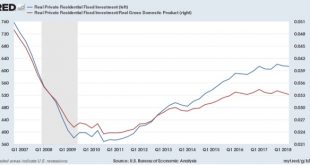What is going on today. Happy Saturday Night!
Read More »Another look at GDP
(Dan here….Lifted from comments here) Spencer says: You can download the most recent GDP in excell form directly from the BEA. In the 2nd quarter exports accounted for 1.12 percentage points of the 4.1% surge in real GDP. That is almost 30% of growth. Apparently the big jump in exports was due to large purchases of soy beans in May, before new tariffs were imposed. This was obviously a one time unusual event that will quickly reverse and dampen real GDP...
Read More »Q2 GDP: likely as good as it is going to get this year
Q2 GDP: likely as good as it is going to get this year [Note: FRED hasn’t gotten around to updating the GDP data. I’ll update this post once the graphs are available. UPDATE: Posted now.] This morning’s preliminary reading of Q2 2018 GDP at +4.1% was generally in line with forecasts. The coincident data, as I’ve reported in my “Weekly Indicators” column, as well as things like industrial production, the regional Fed reports, and real retail sales,...
Read More »Has Trump Won This Easy Trade War With Our Greatest Foe, The European Union?
Has Trump Won This Easy Trade War With Our Greatest Foe, The European Union? So Sean Hannity would have us believe this evening after the press conference earlier today by Trump and EU Commissioner Jean-Claude Juncker. According to Hannity they have signed a “deal” that will help US businesses, workers, and farmers. Yowzah! As it is, what appears to have been agreed to (no signed deal) is that the US will not impose tariffs on autos imported from the...
Read More »Meanwhile, Saudis Stuck On Oil Thanks To MbS Crackdown
Meanwhile, Saudis Stuck On Oil Thanks To MbS Crackdown Saudi Crown Prince Mohammed bin Salman (MbS) has a plan to get Saudi Arabia off oil, with an immediate push to create 1.2 million private sector jobs by 2020. However, as Juan Cole reports, his political crackdown last year in which over 300 people were tossed in jail for various supposed crimes, with many of them now having frozen bank accounts and other restrictions placed on them, has somewhat...
Read More »Open thread July 27, 2018
Accidentally Booked on Fox News
.@teambarbara's website says Congress should "abolish ICE and start fresh, building a new immigration enforcement system that is fair, just, compassionate and reflects the values of a nation of immigrants." She was accidentally booked for a Fox News interview this morning: pic.twitter.com/WFT0JDu88b — Matt Shuham (@mattshuham) July 23, 2018 Accidentally booked on Fox News as the only Democrat who supports ICE. Fox news booked the wrong candidate who...
Read More »Tariffs
Remember, a tariff is a tax. So we have a republican president trying to solve problems by raising taxes. Has anyone told Grover Norquist ?
Read More »Screenwriter Dies at Age 100, Of “Rashomon,” 1950, Greatest Film of Japan Ever.
Shinobu Hashmoto just died at age 100. His original screenplay for the greatest movie ever made in Japan was initially written while he was recovering in a Japanese hospital for war veterans.with him having tuberculosis. It is famous for showing how different observers of reality may have different views of that reality. The film’s director was Kurowsawa, who worked closely with Hashimoto on many of his films. Regarding the greatest of them all,...
Read More »Wage growth….
Economic Policy Institute answers two laymen questions on wage stagnation: Why is wage growth so slow? It’s not because low-wage jobs are being added disproportionately: One explanation worth looking into is whether today’s low wage growth is due to a composition effect—i.e. low-wage jobs being added faster than middle- and/or high-wage jobs and, as a result, pulling down wage growth…But since 2013, as the recovery has strengthened, the opposite has been...
Read More » The Angry Bear
The Angry Bear


